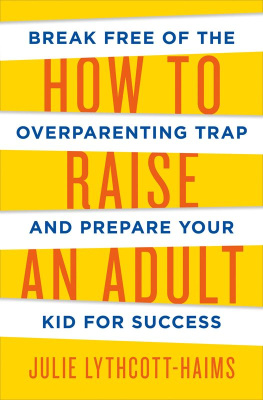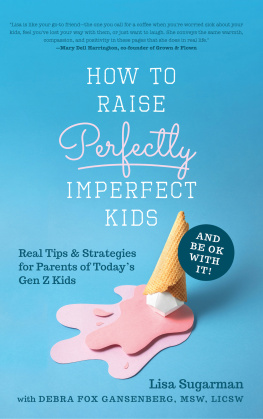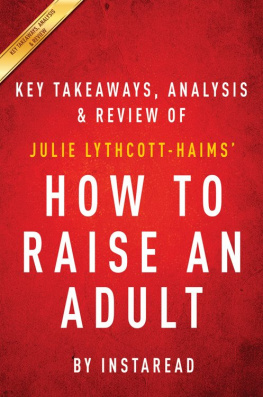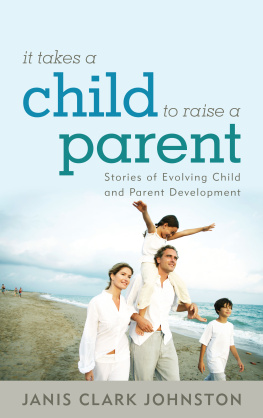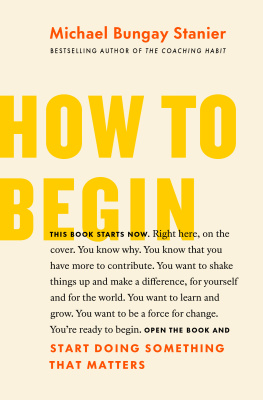
Thank you for buying this
Henry Holt and Company ebook.
To receive special offers, bonus content,
and info on new releases and other great reads,
sign up for our newsletters.

Or visit us online at
us.macmillan.com/newslettersignup
For email updates on the author, click here.
The author and publisher have provided this e-book to you for your personal use only. You may not make this e-book publicly available in any way. Copyright infringement is against the law. If you believe the copy of this e-book you are reading infringes on the authors copyright, please notify the publisher at: us.macmillanusa.com/piracy.
To Dan, who always
~ and ~
To Sawyer and Avery, the soon-to-be adults were raising.
Caminante, no hay camino, se hace camino al andar.
(Traveler, there is no path. The path is made by walking.)
Antonio Machado (18751939)
This is a book about parents who are overinvolved in the lives of their kids. It looks at the love and fear behind our overinvolvement. It looks at the harm we cause when we do too much. And it looks at how we might achieve better long-term endsand help our kids achieve even greater successby parenting differently.
I love my kids as fiercely as any parent does, and I know that love is the foundation for all we do as parents. But in my years researching this book Ive learned that many of our behaviors also stem from fears; perhaps chief among them is the fear that our kids wont be successful out in the world. Of course its natural for parents to want their kids to succeed, but based on research, interviews with more than a hundred people, and my own personal experiences, Ive come to the conclusion that we define success too narrowly. And whats worse, this narrow, misguided definition of success has led us to harm a generation of young adultsour children.
I came to know, care, and worry about young adults over the course of my ten years as freshman dean at Stanford University. I loved that work and found it a sheer privilege to be alongside other peoples eighteen- to twenty-two-year-old sons and daughters as they began to unfold into the adults they would become. My students made me laugh and they made me cry, and I rooted for them no matter what. This book is not an indictment of them or of their generation, people born after 1980known as Millennials. Their parents, though we parents, Ill say, for I, too, am one of them are another story.
I want to put all of my cards on the table. Im not just a former dean at Stanford, Im a graduate from Stanford and Harvard Law School as well. Im writing this book not because of those opportunities, or despite them, but informed by it all, keeping in mind at every turn that my privilege and experience can be both a help and a hindrance in this analysis. And as Ive said, Im also a parent. My husband and I have two teenagersa son and a daughter who are two years apartand we are raising our kids in Palo Alto, in the heart of Silicon Valley, as energetic a hive of overparenting as you are likely to find on the planet. Whereas once upon a time I was a dean at a highly selective university tut-tutting the behaviors of overinvolved parents, in the years Ive spent thinking about this topic Ive slowly come to appreciate that Im not much different from the parents I once rather breezily chastised. In many ways, I am the problem parent Im writing about.
FATHER (AND MOTHER) KNOWS BEST
In the earliest moments our love is our umbilicus, our heartbeat, our body, and then our arms, our kiss, our breast. We bring them home to a sheltering roof and we delight weeks later when they make their first intentional eye contact with us. We nurture early babbles into first words and applaud as they gain strength to roll over, to sit up, to crawl. We scan the horizon of the twenty-first century and see an increasingly interconnected and competitive world that at times seems familiar and at times utterly not. We gaze down at our precious little ones with a promise to do all we can to help them make their way into the long life that lies ahead. There is no amount of direction on our part that will teach them to stand or walk before they are ready. But we are eager for their progress.
We see almost instantly that they are their own person, but we also want them to start where we left off, to stand on our shoulders, to benefit from all we know and can provide. We expose them to experiences, ideas, people, and places that will help them learn and grow. We want them to reach and be stretched by the kind of rigor and opportunity that will maximize their potential and their chances. We know what it takes to succeed in todays world and were quite eager to protect and direct them, and be there for them at every turn, whatever it takes.
Many of us remember a time when, in comparison, parents were rather uninvolved in childhood. When a parent (usually a mom) would throw the door open on weekday afternoons and tell us, Go out and play and be home for dinner. Our parents had no idea where we were or exactly what we were doing. There were no cell phones for keeping in touch or GPS devices for tracking. Off we went into the wilderness of our block, our neighborhood, our town, our vacant lots, our parks, our woods, our malls. Or sometimes, we just snuck a book and sat on the back steps. Childhood doesnt look that way today and many young parents dont relate to childhood ever having been that way.
FATHER AND MOTHER HAVE CHANGED
When, why, and how did parenting and childhood change? Even a cursory hunt yields a bounty of shifts. A number of important ones take place in the mid-1980s.
In 1983, one shift arose from the increased awareness of child abductions. The tragic 1981 abduction and murder of a young child named Adam Walsh became the made-for-television movie Adam , which was seen by a near record-setting 38 million people. Walshs father, John Walsh, went on to lobby Congress to create the National Center for Missing and Exploited Children in 1984, and to found the television show Americas Most Wanted , which aired on Fox beginning in 1988. Our incessant fear of strangers was born.
Another shiftthe idea that our children arent doing enough schoolworkarrived with the publication of A Nation at Risk
A third shift came with the onset of the self-esteem movementa philosophy that gained popularity in the United States in the 1980s that said we could help kids succeed in life if we valued their personhood rather than their outcomes.
And a fourth shift was the creation of the playdate, circa 1984. The very nature of playwhich is a foundational element in the life of a developing childbegan to change.
Observing such shifts among other things, in 1990, child development researchers Foster Cline and Jim Fay coined the term helicopter parent to refer to a parent who hovers over a child in a way that runs counter to the parents responsibility to raise a child to independence. Focused on giving advice to parents of young children, Cline and Fay had their finger on the pulse of important changes that took place in American parenting in the prior decade, and which are commonplace today, twenty-five years later. That means the oldest members of the helicoptered generation turned thirty circa 2010. They are also those known as Generation Y or Millennials.
In the late 1990s, the first of the Millennial generation began going off to college, and my colleagues and I at Stanford began to notice a new phenomenonparents on the college campus, virtually and literally. Each subsequent year would bring an increase in the number of parents who did things like seek opportunities, make decisions, and problem solve for their sons and daughtersthings that college-aged students used to be able to do for themselves. This was not only happening at Stanford, mind you; it was happening at four-year colleges and universities all over the country, as conversations with colleagues nationwide confirmed. Meanwhile my husband and I were raising our two little kids, and without fully realizing it we were doing a good deal of helicoptering in our own home.
Next page
